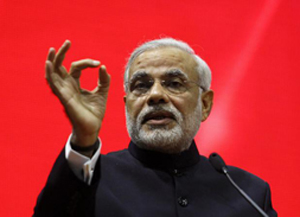New Delhi, Dec 10: Expressing "sorrow" over fresh Parliament disruptions, Prime Minister Narendra Modi today asserted that democracy cannot function at the "whims and fancies" of anyone, in a veiled dig at continuing protests by the Congress.
 Without any reference to Congress, which has held protests in both Houses of Parliament over the National Herald case, Modi said democracy cannot be restricted to elections and governments alone and that one of the two main dangers before it is "Mantantra" (functioning as per one's whims and fancies) with the other being "Dhantantra" (money power).
Without any reference to Congress, which has held protests in both Houses of Parliament over the National Herald case, Modi said democracy cannot be restricted to elections and governments alone and that one of the two main dangers before it is "Mantantra" (functioning as per one's whims and fancies) with the other being "Dhantantra" (money power).
Modi also said the poor are not being able to get their rights as legislations to benefit them are stuck due to disruptions in Parliament. "It is not only GST(bill) but many pro-poor steps are stuck in Parliament."
"You must have seen that these days this(disruptions) is being seen more. Meri Marji (I will do what I desire). I will do whatever comes to my mind. Does the country run like this? Democracy does not function with 'Mantantra'. The country does not run on its basis. Whatever you may think but the system does not run like this," Modi said.
"It is a matter of sorrow that the poor are not being able to get their rights due to Parliament not functioning. However the talk is only centred on GST versus Parliament.
Whatever has to happen with the GST, it will be done in consultation with everybody to decide the fate of India but what about the poor, what about the common man," he said addressing the Jagran Forum of Dainik Jagran here.
"Due to Parliament not running this time a particular law is also stuck up, which we have brought to enhance the bonus amount of the poor in jobs from Rs 3,500 to Rs 7,000. This also seeks to increase the salary ceiling for giving bonuses from the existing Rs 7,000 to Rs 21,000. Is this not directly a work for the poor?", he said
Modi said the Government is requesting that the Parliament be allowed to function.
"And that is why we are requesting for allowing Parliament to run. There cannot be a bigger forum than Parliament for discussion, debate and communication. But if we will negate the institution itself, then there will be question marks on democracy itself.
"We have to keep in mind the dignity of democracy and enact laws for the benefits of the common man and the country. We have to lay emphasis on it, strengthen it," the Prime Minister said.
Drawing an analogy with musical instrument Sitar, he said its both strings need to be tightened to strike the right note as if even one is loose, the right music will not come out.
"If one has influence, one has to convince people of one's views and carry them with him. We cannot run the country like this. In democracy, you have to connect, you have to assimilate. If you have to dilute (your stand), dilute it," he added.
The National Herald issue had cast its shadow over Parliament for last couple of days with Congress members continuously creating uproar in both Houses and blocking the passage of bills.





Comments
Add new comment